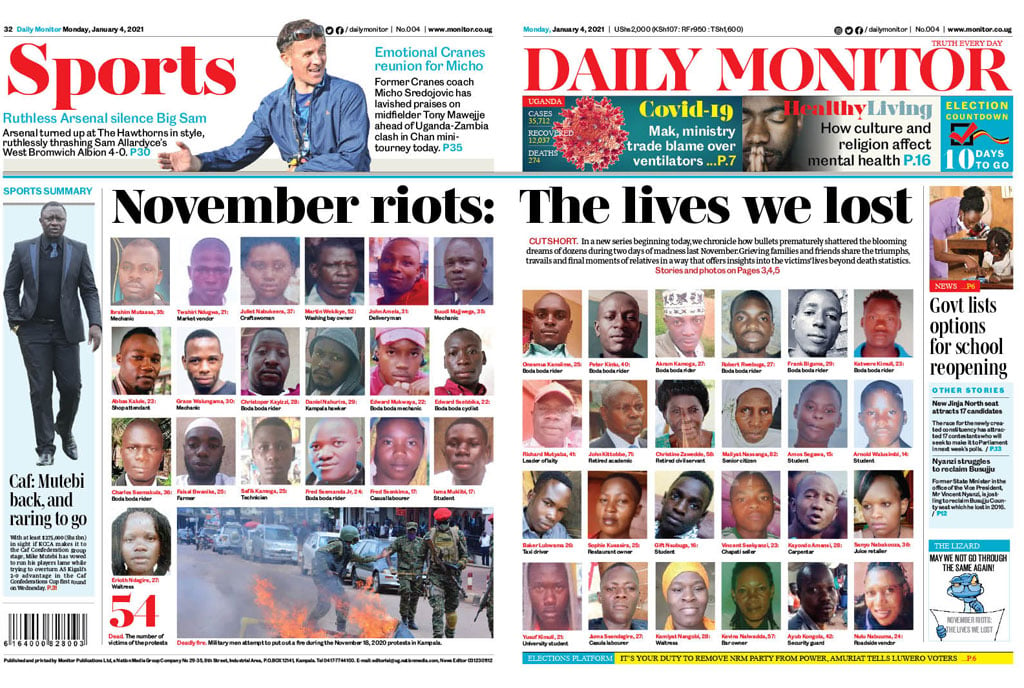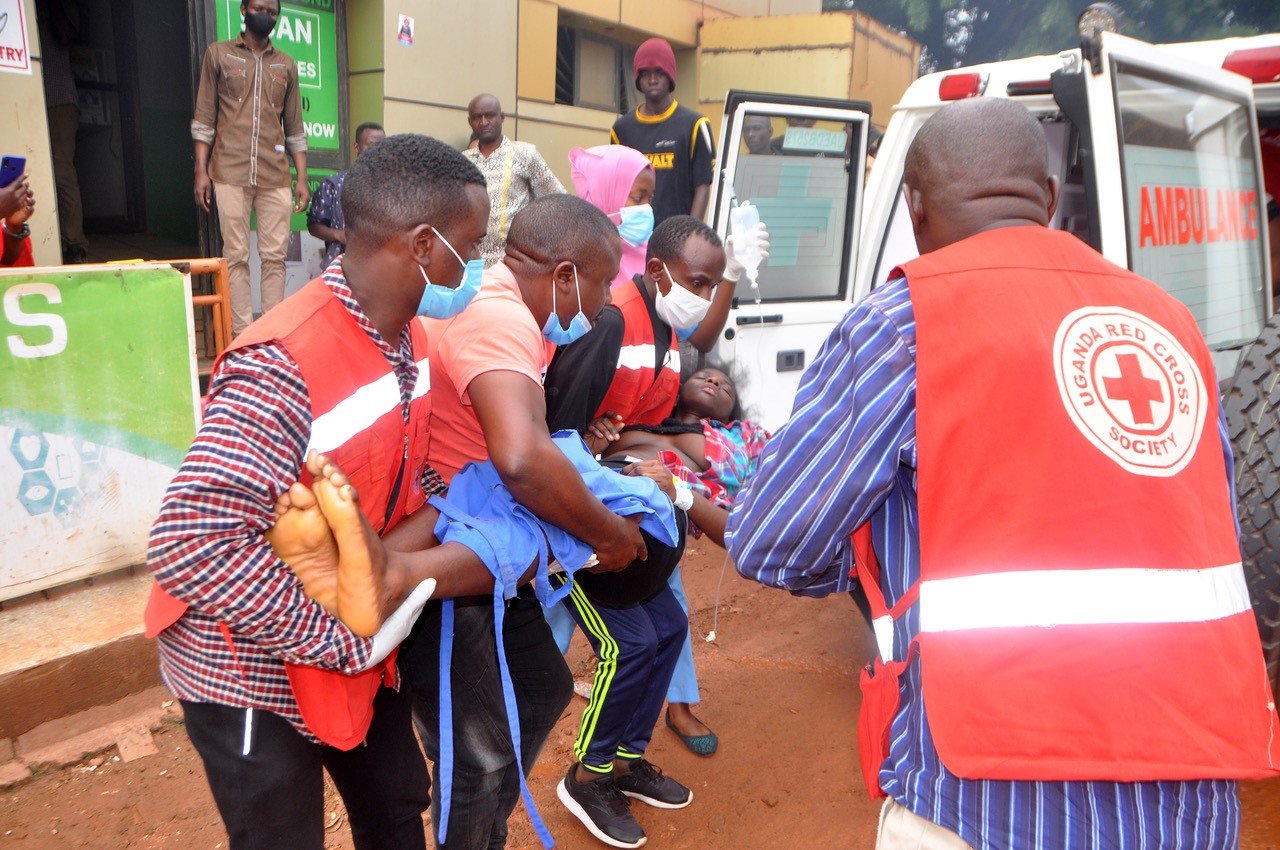Prime
November 18/19 riots: Year of pain and still no justice

This photo of the January 4, 2021 Daily Monitor newspaper shows faces of the people that were ruthlessly killed during deadly clashes between civilians and security forces in Kampala during an electoral season.
What you need to know:
- This week marks a year since November 18, 2020 violent protests erupted in Kampala and other towns after police arrested then National Unity Platform (NUP) party presidential flagbearer Robert Kyagulanyi, alias Bobi Wine, in the eastern Luuka District.
- President Museveni, in an address on November 29, said 54 people were killed, mostly by shooting, during the 3-day disturbances. Police investigated the killings, but shelved the findings contrary to the President’s instructions to make the report public.
- Starting today, Daily Monitor for the first time serialises the full report showing 8 to 11 of those shot dead were “rioters” while 38 were killed by “stray bullets”.
None of the families that lost loved ones in the November 2020 violent protests has received justice or compensation a year, this week, since the disturbances in which protestors reportedly injured security personnel and destroyed personal and public property.
Violent protests erupted in Kampala, the Ugandan capital, and other major cities when police seized the then National Unity Platform (NUP) party presidential candidate Robert Kyagulanyi, alias Bobi Wine, in the eastern Luuka District on allegation of violating Covid-19 guidelines.
Nine days after the November 18-20 riots were subdued, President Museveni, quoting a report by Criminal Investigations Director Grace Akullo, said during a nationally-televised address that 54 people died; 32 were “rioters” and 20 killed by “stray bullets”.
Two victims were hit by cars which careered after stone-hurling protestors distracted the drivers, he said.
Witnesses posthumously identified one woman crushed by a speeding vehicle as 57-year-old Kevina Nalwadda.
“The government will compensate all those who were not rioters, but lost life in this confusion. If you are a rioter, we cannot compensate you. No way! And the government will also compensate those who lost their properties, if it can be verified,” he said in a November 29 address delivered from Mbale.
It will be a year this Thursday, but the government has neither delivered justice nor compensation for the deceased.
Mr Kiryowa Kiwanuka, the attorney general and chief government legal advisor, told this newspaper last evening that some of the aggrieved parties had petitioned his office over the delayed compensation and the matter was being handled.
“When a person complains, we get details of their case and person making the claim. There is a process … currently ongoing to see that these people are compensated, which is part of the justice that they deserve,” he said.
Daily Monitor covered the killings in an incisive series titled; November riots: lives we lost, published for more than a week from January 4, 2021.
Accounts offered then by witnesses during our investigations showed that nearly half-a-dozen of those killed in the protests were students, more than 10 were boda bodas and six were mechanics.
In addition, we found that bullets caught half-a-dozen of the victims in the stomach, a similar number were shot in the neck while about 10 took bullets in the rib cage, chest and back.
At least three of the lethal shots were directly attributed to men in plain-clothes, part of many that fanned out with assault rifles onto city streets and neighbourhoods to quell the three-day madness in the city centre.
Witnesses, who spoke to us identified the security forces by their uniforms and insignia to belong to UPDF, police and Local Defence Unit (LDU). They told this newspaper that the security forces fired volleys of bullets indiscriminately, hitting at least a dozen of the victims in the head.
The police investigated the killings and in a December 5, 2020 report, CID Director Akullo noted that Hussein Senoga and Grace Walungama were shot dead by LDU operatives.
Our tally from figures contained in her 86-page report, shows that 38 victims of the November riots were killed by “stray bullets”, 8 were named as “rioters” and one knocked by a careering car while LDUs killed 2, adding to 49.
This is less by five of the 54 victims specified in Director Akullo’s 8-page summary of the report prepared for the Inspector General of Police. A 3-page “list of victims of death during the [1]8th November 2020 riots in Kampala metropolitan area and other parts of the country” attached to the main report, however, only names 8 victims as “rioters”.
These details contradict initial briefing to the President that 32 of those shot were “rioters”.
In response to our inquiries yesterday, officials admitted that none of the security personnel alleged to have shot civilians while subduing the November 2020 riots had been administratively reprimanded or criminally prosecuted.
This despite President Museveni directing that culpable officers be prosecuted alongside a deeper inquiry into what the legitimate targets for the so-called lethal “stray bullets” were.
“There are no conclusive findings as of yet, but once we have a final report, we shall avail it [to] the public. The [security] officers found culpable will be dealt with in accordance with the law,” Police spokesperson Fred Enanga said last evening, despite the Force he speaks for having produced a report of its investigations into the killing 11 months ago.
Then Foreign Affairs minister Sam Kutesa shared a copy of the report with diplomats representing countries that are permanent members of United Nations Security Council during a meeting on April 13. The police, despite guidance by the President, did not make its findings public or available to Ugandans who lost relatives in the mayhem.
On her part, Defence and Military Spokesperson, Brig Flavia Byekwaso, yesterday said: “I haven’t been following this matter, the police [are] the ones doing the investigations because when these matters came to us, we forwarded them to police for investigations.”
Following this newspaper’s sustained reporting demanding accountability for the lives lost, including its May 31 story based on findings by The BBC Africa Eye documentary: Three Killings in Kampala, police summoned and interrogated Nation Media Group-Uganda’s Managing Editor, Tabu Butagira, against whom they preferred holding charges of incitement to violence and promoting sectarianism.
The ambiguity about who shot at and killed Ugandan civilians, or commanded the operations, has made it difficult to find a closure, according to some relatives of the victims.
For instance, Ms Aisha Robinah Nantume, a mother of late Innocent Nduggwa, a shop keeper shot dead in Kisenyi in Kampala, said in order to pursue both compensation and prosecution, police tasked her and she collected letters from the Local Council I, Old Kampala Police Station and a death certificate from Mulago National Referral Hospital to prove the circumstances of her son’s death.
“I have got these letters, but now I don’t know what to use them for because there is nowhere to take them. Police [have] tossed me until I got tired,” she said.

People walk through a deserted street after riots broke out in downtown Kampala on November 18, 2020. PHOTO/ STEPHEN OTAGE
Mr Isaiah Ssebwami, a brother of Willy Kayondo shot dead at Kubbiri Kalerwe road-about in Kampala, said police at Wandegeya Division headquarters tasked them to provide evidence that the deceased was their brother and was indeed dead.
They did, including providing a death certificate from Mulago Hospital, and police afterwards promised to contact the family, which they haven’t to-date.
In his November 29 address, President Museveni said a “multi-force” was activated to respond to crackdown on the lawlessness. In another televised address, he said elements of the Special Forces that distinguished themselves in fighting against the Allied Democratic Forces in the Democratic Republic of Congo and al-Shabaab in Somalia, took out some of the “terrorists” and stopped the violence.
Extract of Museveni’s first address on Riots
When, therefore, [then National Unity Platform party presidential candidate) Hon (Robert) Kyagulanyi, [alias Bobi Wine], and [Forum for Democratic Change party president], Hon (Patrick Oboi) Amuriat, another [presidential contender], were arrested on November 18, [2020], those criminal gangs who were sponsored by political opportunists and backed by some external elements planned to execute the long planned scheme.
They started burning tyres on the roads, mounting illegal roadblocks, robbing Ugandans [of property], beating people, attacking people with [the ruling] National Resistance Movement party uniforms, stoning cars, stoning personnel etc.
Anyone who undresses an African woman, NRA (precursor to UPDF) deals with him [or her].
In spite of the weaknesses of the police that allows such impunity [and] lawlessness to persist in our towns --- because it has been there all this time, but the police [have] been doing nothing about it, they have been coexisting with it --- the overall security posture of Uganda is robust. That is where many people make a miscalculation because they don’t know our method.
There is a saying in our language about someone who drowned in a lake thinking it was a pond.
A multi-force response was immediately activated and 1,014 suspects were arrested of whom 843 suspects were charged in courts of law, including Kyagulanyi, 699 were remanded, 93 were released on court bail and 113 were released on police bond, including Hon Amuriat.
Twenty-one were cleared and released and 13 are still in police custody pending court [decision], including those who burnt Wobulenzi Magistrate’s car [and are] facing charges of terrorism.
Unfortunately, 54 people died in this confusion; 32 of the dead were rioters, according to the report from police [Criminal Investigations Director] Grace Akullo, some were hit by stray bullets ... and two victims were knocked by a vehicle, Reg No UAW 827N, which lost control after the driver was hit by stones.
And another vehicle with President Museveni’s pictures where the driver was also hit by a stone also lost control and knocked somebody.
It is criminal to attack security forces by throwing stones or attempting to disarm them. In that scenario, the police will legitimately fire directly at the attackers if they fail to respond to the firing in the air.
I extend condolences to all Ugandans and their families that lost their lives in these senseless riots. The government will compensate all those who were not rioters, but lost life in this confusion. If you are a rioter, we cannot compensate you. No way! And the government will also compensate those who lost their properties, if it can be verified.
The President delivered this address in Mbale on November 29, 2020.
Transcribed by Derrick
Wandera




